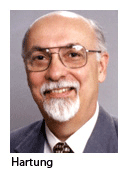With Dr. Bruce Hartung
Q: I am a retired pastor. Some other retired pastors and I have been talking lately about the role a retired pastor takes in the congregation where he has current membership. We came up with some suggestions of our own, but wanted to have you address the issue as well.
What about being asked back to the congregation we retired from for weddings, baptisms, and funerals?
Some of us have been designated as “pastor emeritus” in our former congregations. Is that a good idea?
Since we’ve moved … after retiring, I am involved in a congregation where I’ve helped out on occasion, and am called “pastor” by many members of the congregation. Most of the time I’m OK with that, especially when I’m working with the pastor called to this church. However, recently a rift has developed between the pastor and a significant number of people in the congregation. What shall I do, particularly since I tend to agree with the concerns of those members?
A: In this month’s column I cannot take up all that you ask. But I will start with your last point — your role as a retired pastor and your concern about the “rift” developing between the pastor and some members of the parish. To address  this, I have done some research into policies that have already been developed.
this, I have done some research into policies that have already been developed.
Here is one that I like from the Presbytery of Arkansas: “Although a former pastor, a retired pastor, or a Minister of the Word and Sacrament serving in another capacity within the community is likely to be interested in the health of the congregation, it is imperative that members avoid discussing issues concerning the congregation, the current pastor/co-pastors, the staff … or any other aspect of congregational life with a former pastor or other ordained minister worshipping within the congregation. … While members of congregations are encouraged to avoid putting a pastor in such a position, it remains the responsibility of the pastor to maintain the appropriate boundaries. … It is inappropriate for any member of the congregation to seek counsel, solicit advice, or seek pastoral care from any minister, honorably retired or otherwise, who is not currently serving [as] a pastor, co-pastor, or parish associate of the church. To draw an honorably retired minister into disputes between members and the current pastoral leadership will not only make matters worse, but will put the retired minister in an awkward and untenable ethical situation.”
In a protocol adopted by the bishops of the Northern and Southern Provinces of the Moravian Church, the following response is suggested to be used by retired pastors still in the community in which they served when approached about a congregational “rift”: “I am no longer your pastor; you really need to talk with your new pastor or a member of the board about those concerns.”
This is applicable in the situation you describe by changing the first clause to “I am not your pastor.”
An Evangelical Lutheran Church in America policy in the La Crosse Area Synod declares: “Ordained ministers shall respect the integrity of the ministry of congregations which they do not serve and shall not exercise ministerial functions therein unless invited to do so by the pastor.”
In our tradition, a central part of the question comes down to who has been called through a divine call to be the pastor. It is not you, as a retired pastor; nor is it me, as a seminary professor in the parish to which I belong. It is the person called into the office of pastor.
As a member of a congregation, you would likely do well to express your concerns to the pastor and encourage others to do so as well. In so doing, you are speaking for yourself.
But, as difficult as it may be, it is just not your (or my) call to do otherwise than be a member of the parish.
Luther once made the point that conflict would be reduced if folks would stay out of involvement in what is not their duty or vocation. This is difficult to do (at least for me), but great advice.
Rev. Bruce M. Hartung, Ph.D., is the dean of Ministerial Formation at Concordia Seminary, St. Louis. He can be reached at hartungb@csl.edu.
Posted Dec. 28, 2009



